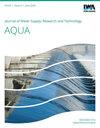改进的增强差分进化算法在洪水期间水库运行中的应用:一个案例研究
IF 4.3
Q2 Environmental Science
引用次数: 0
摘要
汛期水库运行是一个复杂的问题,其中最优决策是一项困难的任务。本文提出了一种解决多用途油藏驱油问题的方法。选择印度中部纳尔马达河上的一个水库作为案例研究。多目标问题包括水电释放最大化、泄漏最小化和在运行期结束时达到规定的目标库存量。所选择的优化模型是差分评估算法(DEA)及其变体:增强型差分进化算法(EDEA)和改进型增强型差分算法(MEDEA)。本文将EDEA模型修正为MEDEA模型。将三种模型应用于同一案例研究的结果在收敛性上进行了比较。所有三种算法都在两个流行的基准函数Ackley和Sphere上进行了测试。两种应用的结果都表明,MEDEA在收敛到最优解方面是最好的,表现出更好的稳定性和最终结果的质量。本文章由计算机程序翻译,如有差异,请以英文原文为准。
Application of modified enhanced differential evolution algorithms for reservoir operation during floods: a case study
Operating a reservoir during flooding is a complex problem in which optimum decision-making is a difficult task. The present study demonstrates a solution for the operation of flooding problem in a multiple-purpose reservoir. A reservoir on River Narmada in central India is chosen as the case study. The multiple objective problems comprised maximization of hydropower releases, minimizing spills, and achieving stipulated target storage at the end of the operation period. The chosen optimization models are the Differential Evaluation Algorithm (DEA) and its variants: the Enhanced Differential Evolution Algorithm (EDEA) and the Modified Enhanced Differential Algorithm (MEDEA). The EDEA model is modified in the present study to MEDEA. The results of all three models applied to the same case study are compared on convergence to an optimal solution. All three algorithms were tested on two of the popular benchmark functions that are Ackley and Sphere. The results of both applications demonstrated that MEDEA proved to be the best in terms of converging to the optimal solution, exhibiting better stability, and quality of final results.
求助全文
通过发布文献求助,成功后即可免费获取论文全文。
去求助
来源期刊
CiteScore
4.70
自引率
0.00%
发文量
74
审稿时长
4.5 months
期刊介绍:
Journal of Water Supply: Research and Technology - Aqua publishes peer-reviewed scientific & technical, review, and practical/ operational papers dealing with research and development in water supply technology and management, including economics, training and public relations on a national and international level.

 求助内容:
求助内容: 应助结果提醒方式:
应助结果提醒方式:


